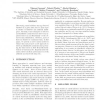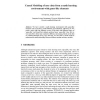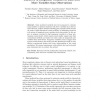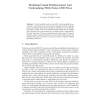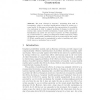115
click to vote
CORR
2012
Springer
13 years 9 months ago
2012
Springer
Discovering causal relations among observed variables in a given data set is a main topic in studies of statistics and artificial intelligence. Recently, some techniques to disco...
128
click to vote
AIED
2011
Springer
14 years 5 months ago
2011
Springer
We have created a math learning environment with game-like elements such as narrative, visual feedback, personalization, collection, etc. We made a study with four different versio...
133
click to vote
JMLR
2011
14 years 9 months ago
2011
The causal notions embodied in the concept of Granger causality have been argued to belong to a different category than those of Judea Pearl’s Causal Model, and so far their re...
124
click to vote
LOGCOM
2007
15 years 1 months ago
2007
Structural causal models offer a popular framework for exploring causal concepts. However, due to their limited expressiveness, structural models have difficulties coping with su...
126
click to vote
ISCI
2008
15 years 2 months ago
2008
This paper describes an evolutionary method for identifying a causal model from the observed time series data. We use a system of ordinary differential equations (ODEs) as the cau...
116
click to vote
CORR
2006
Springer
15 years 2 months ago
2006
Springer
The estimation of linear causal models (also known as structural equation models) from data is a well-known problem which has received much attention in the past. Most previous wo...
116
click to vote
ICANN
2010
Springer
15 years 3 months ago
2010
Springer
Many statistical methods have been proposed to estimate causal models in classical situations with fewer variables than observations. However, modern datasets including gene expres...
106
click to vote
IJCAI
1993
15 years 3 months ago
1993
: This paper presents a causal simulation method for incompletely known dynamic systems in process engineering. The causal model of a process is represented as both a causal networ...
110
click to vote
AI
2006
Springer
15 years 5 months ago
2006
Springer
Abstract. Causal modeling, such as noisy-OR, reduces probability parameters to be acquired in constructing a Bayesian network. Multiple causes can reinforce each other in producing...
ECSQARU
2001
Springer
15 years 6 months ago
2001
Springer
The term “changes in structure,” originating from work in econometrics, refers to structural modifications invoked by actions on a causal model. In this paper we formalize the...
